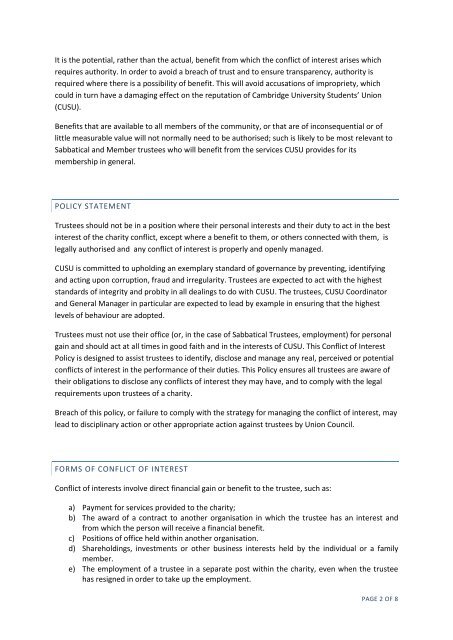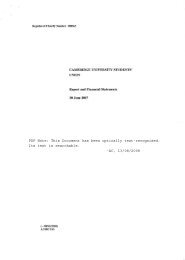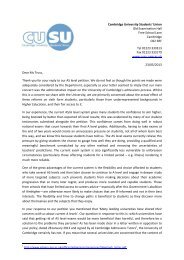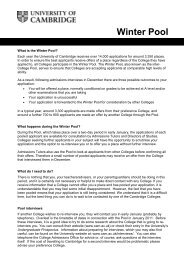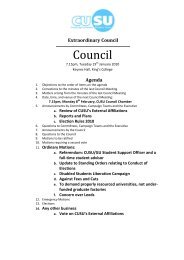conflicts of interest policy - Cambridge University Students' Union
conflicts of interest policy - Cambridge University Students' Union
conflicts of interest policy - Cambridge University Students' Union
Create successful ePaper yourself
Turn your PDF publications into a flip-book with our unique Google optimized e-Paper software.
It is the potential, rather than the actual, benefit from which the conflict <strong>of</strong> <strong>interest</strong> arises whichrequires authority. In order to avoid a breach <strong>of</strong> trust and to ensure transparency, authority isrequired where there is a possibility <strong>of</strong> benefit. This will avoid accusations <strong>of</strong> impropriety, whichcould in turn have a damaging effect on the reputation <strong>of</strong> <strong>Cambridge</strong> <strong>University</strong> Students’ <strong>Union</strong>(CUSU).Benefits that are available to all members <strong>of</strong> the community, or that are <strong>of</strong> inconsequential or <strong>of</strong>little measurable value will not normally need to be authorised; such is likely to be most relevant toSabbatical and Member trustees who will benefit from the services CUSU provides for itsmembership in general.POLICY STATEMENTTrustees should not be in a position where their personal <strong>interest</strong>s and their duty to act in the best<strong>interest</strong> <strong>of</strong> the charity conflict, except where a benefit to them, or others connected with them, islegally authorised and any conflict <strong>of</strong> <strong>interest</strong> is properly and openly managed.CUSU is committed to upholding an exemplary standard <strong>of</strong> governance by preventing, identifyingand acting upon corruption, fraud and irregularity. Trustees are expected to act with the higheststandards <strong>of</strong> integrity and probity in all dealings to do with CUSU. The trustees, CUSU Coordinatorand General Manager in particular are expected to lead by example in ensuring that the highestlevels <strong>of</strong> behaviour are adopted.Trustees must not use their <strong>of</strong>fice (or, in the case <strong>of</strong> Sabbatical Trustees, employment) for personalgain and should act at all times in good faith and in the <strong>interest</strong>s <strong>of</strong> CUSU. This Conflict <strong>of</strong> InterestPolicy is designed to assist trustees to identify, disclose and manage any real, perceived or potential<strong>conflicts</strong> <strong>of</strong> <strong>interest</strong> in the performance <strong>of</strong> their duties. This Policy ensures all trustees are aware <strong>of</strong>their obligations to disclose any <strong>conflicts</strong> <strong>of</strong> <strong>interest</strong> they may have, and to comply with the legalrequirements upon trustees <strong>of</strong> a charity.Breach <strong>of</strong> this <strong>policy</strong>, or failure to comply with the strategy for managing the conflict <strong>of</strong> <strong>interest</strong>, maylead to disciplinary action or other appropriate action against trustees by <strong>Union</strong> Council.FORMS OF CONFLICT OF INTERESTConflict <strong>of</strong> <strong>interest</strong>s involve direct financial gain or benefit to the trustee, such as:a) Payment for services provided to the charity;b) The award <strong>of</strong> a contract to another organisation in which the trustee has an <strong>interest</strong> andfrom which the person will receive a financial benefit.c) Positions <strong>of</strong> <strong>of</strong>fice held within another organisation.d) Shareholdings, investments or other business <strong>interest</strong>s held by the individual or a familymember.e) The employment <strong>of</strong> a trustee in a separate post within the charity, even when the trusteehas resigned in order to take up the employment.PAGE 2 OF 8


